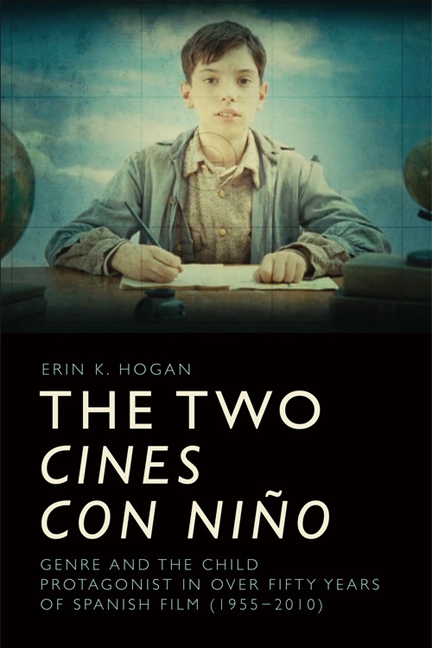Book contents
- Frontmatter
- Contents
- List of Figures
- Acknowledgements
- Figure Permissions
- Introduction The Two Cines Con Niño: The Ventriloquism, Dialogism and Biopolitics of the Children of Franco in Genre Film
- 1 The Black Market and the Stolen Children of Franco in Demonios En El Jardín
- 2 The Appropriative and Carnivalesque Ventriloquism of Altar Boys from Joselito in El pequeño ruiseñor to Ignacio in La mala Educación
- 3 Ventriloquism, Kidnapping and the Carnivalesque in Marisol’s Tómbola
- 4 Adopting, Adapting and Appropriating in the cines con niño: Un rayo de luz and El viaje de Carol
- 5 Prosopopeia and the Gothic Child from Marcelino pan y vino to El Orfanato
- 6 Dialogism and Ritual Function of the Nuevo Cine Con Niño: El Espíritu De La Colmena, Secretos Del Corazón And El Laberinto Del Fauno
- 7 Queering Post-war Childhood in Urte Ilunak and Pa Negre
- 8 The Transatlantic Dialogism in Narrative and Aesthetics of Bildungsfilms: La Lengua De Las Mariposas, Machuca, El Espíritu De La Colmena, El Premio, El Laberinto Del Fauno And Infancia Clandestina
- Conclusion Spanish Movies: Genre, Nation and Spanish Movie
- Select Filmography
- Select Bibliography
- Index
7 - Queering Post-war Childhood in Urte Ilunak and Pa Negre
Published online by Cambridge University Press: 01 May 2021
- Frontmatter
- Contents
- List of Figures
- Acknowledgements
- Figure Permissions
- Introduction The Two Cines Con Niño: The Ventriloquism, Dialogism and Biopolitics of the Children of Franco in Genre Film
- 1 The Black Market and the Stolen Children of Franco in Demonios En El Jardín
- 2 The Appropriative and Carnivalesque Ventriloquism of Altar Boys from Joselito in El pequeño ruiseñor to Ignacio in La mala Educación
- 3 Ventriloquism, Kidnapping and the Carnivalesque in Marisol’s Tómbola
- 4 Adopting, Adapting and Appropriating in the cines con niño: Un rayo de luz and El viaje de Carol
- 5 Prosopopeia and the Gothic Child from Marcelino pan y vino to El Orfanato
- 6 Dialogism and Ritual Function of the Nuevo Cine Con Niño: El Espíritu De La Colmena, Secretos Del Corazón And El Laberinto Del Fauno
- 7 Queering Post-war Childhood in Urte Ilunak and Pa Negre
- 8 The Transatlantic Dialogism in Narrative and Aesthetics of Bildungsfilms: La Lengua De Las Mariposas, Machuca, El Espíritu De La Colmena, El Premio, El Laberinto Del Fauno And Infancia Clandestina
- Conclusion Spanish Movies: Genre, Nation and Spanish Movie
- Select Filmography
- Select Bibliography
- Index
Summary
Introduction: Beyond the Two Spains
In Chapter Seven, we investigate films that challenge the binary of the two Spains, two cines con niño, and genre films. The concept of the two Spains is centralist and elides the country's complex history with plurinationalism. The Second Republic (1932–9) approved the autonomous status of Catalonia in 1932 and the Basque Country in 1935, which were annulled with Franco's victory in the Spanish Civil War and then re-established by the constitution of 1978 (Pereira-Muro 2003: 236, 244, 247). In Fernando León Solís's overview of the binary, he considers the conflict between the two Spains and the country's historic nationalities:
The strength of the ideological divisions is epitomized by the Manichean and almost mythological struggle between ‘The Two Spains’ (Las dos Españas) – the conservative and the liberal. Two groups that fight ‘for the appropriation of the identity of the nation’ (Morón Arroyo, 1996: 180), and whose strong opposition has been pointed out (rather simplistically, one might say) as the reason for the breakout of the Spanish Civil War (1936–1939). This divide has haunted Spanish society for so long and with such intensity that bringing it to an end was one of the greatest aims of the 1978 Constitution of the new democracy after the death of Franco. (León Solís 2003: 1–2)
Over the course of The Two cines, we have followed how the conflict over appropriation of the child and nation has played out in the narrative of Spain's child-starred cinemas. The majority of these productions, however, collectively contribute to the cultural marginalisation of the periphery of Spain, its languages, its cultures, and its historic nationalities through exclusion. Agustí Villaronga's Pa negre (Black Bread) (2010) and Arantxa Lazkano's Urte ilunak (The Dark Years) (1992) respond to portrayals of the two Spains by problematising and deconstructing the binary through heteroglossia, dialogism, and hybridity.
I will argue that Mallorcan director Agustí Villaronga's Pa negre (2010) shares commonalities with earlier features – El espíritu de la colmena (Víctor Erice 1973), Cría cuervos (Carlos Saura 1976), Urte ilunak (Arantxa Lazkano 1993), Secretos del corazón (Montxo Armendáriz 1997) and La mala educación (Pedro Almodóvar 2004) – but is unique in the nuevo cine con niño for its queering of childhood.
- Type
- Chapter
- Information
- The Two cines con niñoGenre and the Child Protagonist in Fifty Years of Spanish Film (1955–2010), pp. 141 - 163Publisher: Edinburgh University PressPrint publication year: 2018



